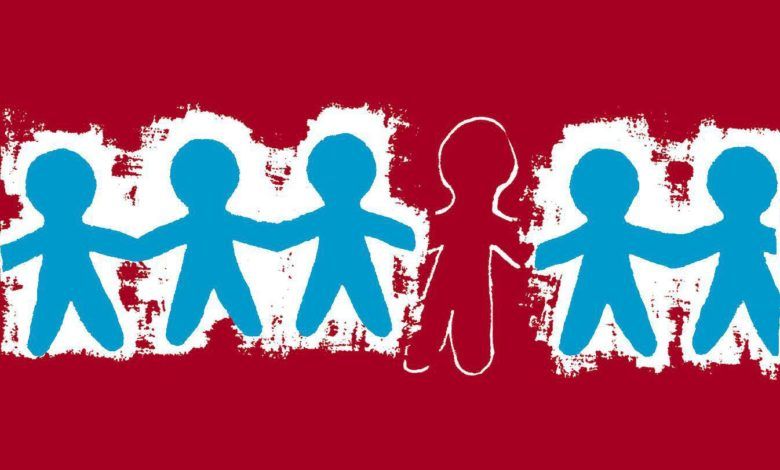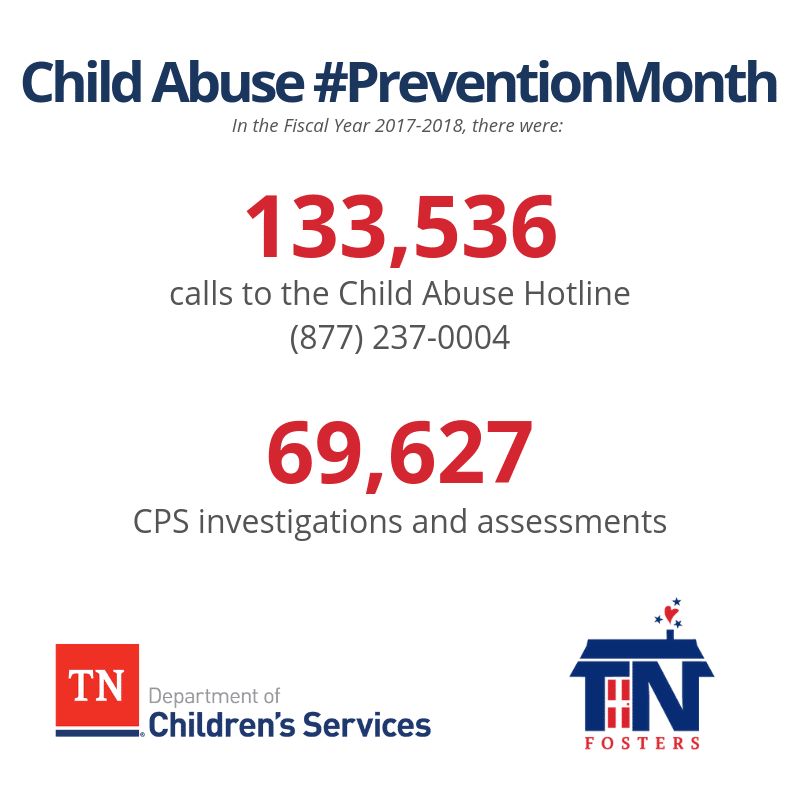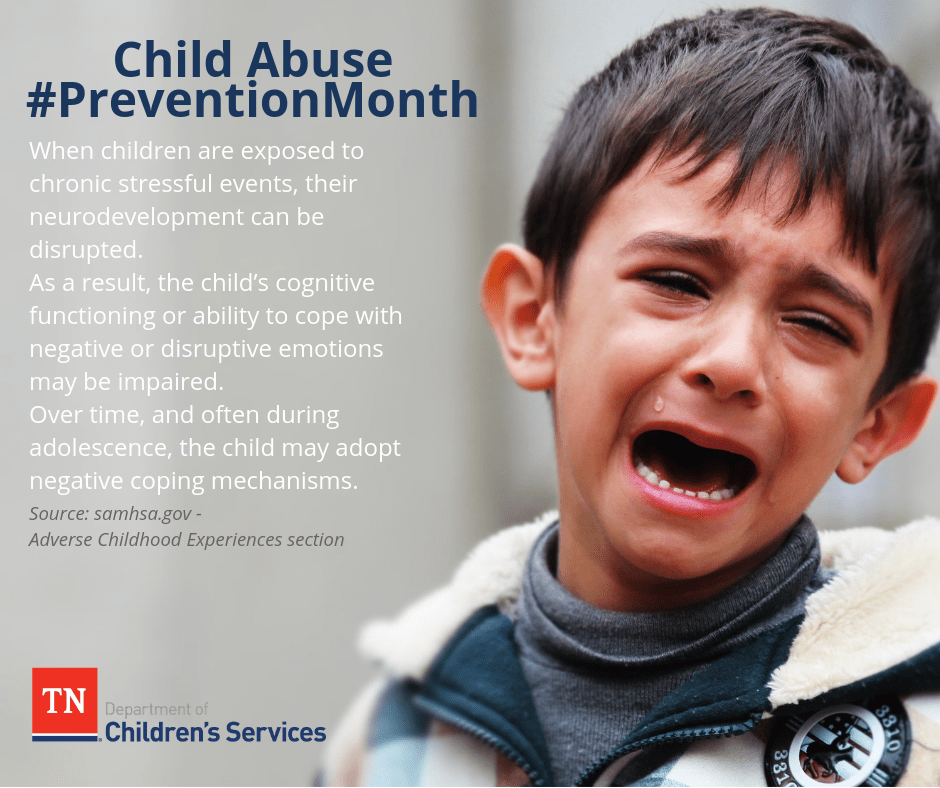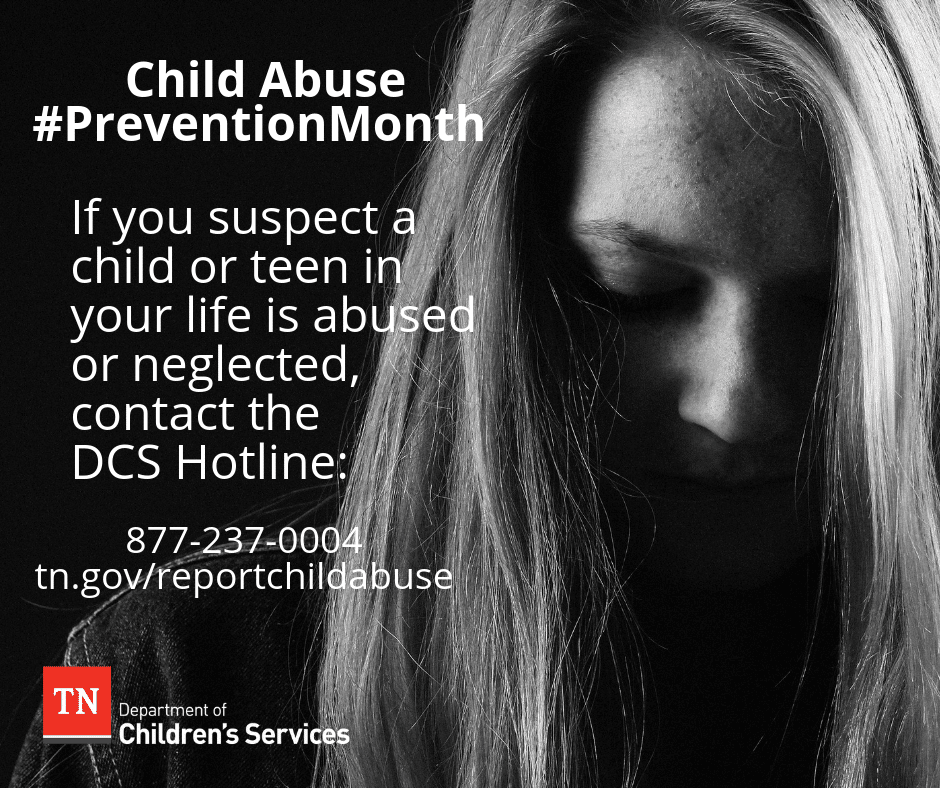Mes Nacional de la Prevención de Abuso Infantil: El índice de abuso infantil crece en Tennessee, hay que crear conciencia

National Child Abuse Prevention Month: Child Abuse Is Increasing in Tennessee, Let’s Create Awareness
Por Vivian Fernández – LPL
 MEMPHIS, TN (LPL) — Abril es el Mes Nacional de la Prevención de Abuso Infantil, un tema que nos concierne a todos, sin importar la raza o el estatus socioeconómico. Hoy en día, es alarmante ver cómo el número de casos de abuso infantil ha aumentado en Estados Unidos, particularmente en Tennessee, por lo que es de suma importancia comenzar a crear conciencia a través de campañas y programas educativos.
MEMPHIS, TN (LPL) — Abril es el Mes Nacional de la Prevención de Abuso Infantil, un tema que nos concierne a todos, sin importar la raza o el estatus socioeconómico. Hoy en día, es alarmante ver cómo el número de casos de abuso infantil ha aumentado en Estados Unidos, particularmente en Tennessee, por lo que es de suma importancia comenzar a crear conciencia a través de campañas y programas educativos.
Según el Departamento de Servicio Infantil de TN (TN Dept. of Children’s Services/DCS), unos 133.536 casos de abuso/negligencia infantil fueron reportados en el año fiscal 2017-2018; 69.627 de esos reportes ya han sido investigados y evaluados.
En el último año fiscal (2018), el Equipo de Investigación Sobre la Protección Infantil del Condado de Shelby (Shelby County Child Protection Investigation Team), cuya sede se encuentra en el Memphis Child Advocacy Center, estudió 3.660 reportes de sospecha de abuso infantil. De acuerdo con Chris Jones, Especialista en Comunicación en el Memphis CAC, cerca del 2% de esos niños eran hispanos.
Tras conocer estos datos, es importante que la comunidad comprenda la magnitud del asunto y aprenda a reconocer cuáles son las señales del abuso infantil, para luego saber cómo prevenirlo.
Lo primero que se debe hacer es llamar al 1-877-237-0004 (Tennessee Child Abuse Hotline) para reportar cualquier tipo de abuso infantil, así se trate de una simple sospecha; además que es algo requerido por la ley del estado de Tennessee. Esta línea cuenta con servicio al cliente en español las 24 horas del día.
El reporte de abuso infantil no significa necesariamente que los niños serán separados de sus familias. Más bien, el Departamento de Servicio Infantil (DCS, por sus siglas en inglés) ofrece la educación y todos los recursos necesarios para ayudar a que los padres sean mejores y puedan mantener a sus hijos a salvo.
La prevención es también una de las mejores formas de detener el abuso infantil; la clave está en entender que la mayoría de los niños son abusados por alguien que la familia conoce.
“El abuso sexual infantil es un delito que a menudo es perpetrado por alguien que el niño conoce. Muchas veces, es una persona de confianza para la familia también”, dijo Jones. “Los padres pueden ayudar a prevenir el abuso infantil manteniendo conversaciones con sus hijos sobre los límites sexuales, defendiendo la política de seguridad de los niños dentro y fuera del hogar y aprendiendo cómo los perpetradores manipulan a los niños y sus familias con el tiempo. Es importante creerle a un niño cuando éste revela que sufrió de algún tipo de abuso o contacto incómodo, y luego hay que denunciar el suceso. Los adultos que trabajan con niños también deben recibir capacitación sobre cómo reconocer, responder y prevenir el abuso sexual infantil”.
 Según Jones, el Memphis Child Advocacy Center tiene un programa, llamado “Stewards of Children”, que educa a los padres, así como a los profesionales y voluntarios que trabajan con niños, sobre cómo prevenir el abuso infantil y responder cuando se presenta un caso de estos. “Más de 24.000 adultos del condado de Shelby han asistido a la capacitación de ‘Stewards of Children’. Proporcionamos la capacitación en organizaciones que prestan servicios a los jóvenes y también ofrecemos clases de capacitación en CAC dos veces al mes para las personas que estén interesadas. Además, nuestro equipo de prevención ofrece un taller sobre políticas de seguridad infantil a organizaciones varias veces al año. En este taller, los asistentes aprenden a desarrollar o modificar la política de protección infantil”, indicó Jones.
Según Jones, el Memphis Child Advocacy Center tiene un programa, llamado “Stewards of Children”, que educa a los padres, así como a los profesionales y voluntarios que trabajan con niños, sobre cómo prevenir el abuso infantil y responder cuando se presenta un caso de estos. “Más de 24.000 adultos del condado de Shelby han asistido a la capacitación de ‘Stewards of Children’. Proporcionamos la capacitación en organizaciones que prestan servicios a los jóvenes y también ofrecemos clases de capacitación en CAC dos veces al mes para las personas que estén interesadas. Además, nuestro equipo de prevención ofrece un taller sobre políticas de seguridad infantil a organizaciones varias veces al año. En este taller, los asistentes aprenden a desarrollar o modificar la política de protección infantil”, indicó Jones.
Otra gran manera de prevenir el abuso infantil es manteniendo una excelente relación y comunicación con los hijos, de manera que ellos se sientan cómodos de compartir sus penas e inquietudes. Los padres deben hablar con sus hijos sobre el tema de abuso infantil, y enseñarles cuáles son las reglas más claras y apropiadas para cada edad en cuanto a tocar a alguien. Los padres también deben orientar a sus hijos e inculcarles que nunca deben tener miedo de decir si alguien rompió esas reglas y los tocó de forma indebida. Los niños tienen que saber que no se van a meter en problemas por decir lo que les pasó.
El saber reconocer las señales de abuso infantil –ya sea físico, emocional o de comportamiento- es otra forma de prevención. Estas señales pueden incluir marcas cuestionables en la piel, contusiones, quemaduras, fracturas, infecciones genitales, dolor en los genitales, cambios abruptos en el comportamiento o la personalidad, cambios drásticos en el apetito, pensamientos suicidas, baja autoestima, el uso del alcohol y las drogas, ausencias frecuentes a la escuela, o hasta un comportamiento/conocimiento sexual inapropiado para la edad del niño. Otras señales pueden ser la depresión, el aislamiento, el miedo y la ansiedad. El niño también puede presentar temor de ir al baño o de regresar a su casa –algunos de los casos de abuso infantil suceden en los baños.
Es de suma importancia hablar con el niño y preguntarle si está bien o no, y sobre todo, preguntarle qué fue lo que pasó.
Para saber más sobre cómo prevenir o reportar el abuso infantil, se recomienda llamar a las siguientes organizaciones:
* TN Dept. of Children’s Services
Línea directa: 1-877-237-0004
También se puede hacer la denuncia en https://apps.tn.gov/carat/
Website: https://www.tn.gov/dcs/
 * The Memphis Child Advocacy Center
* The Memphis Child Advocacy Center
1085 Poplar Avenue, Memphis, TN 38105
Telf: (901) 525-2377
Website: https://www.memphiscac.org
Esta organización cuenta con profesionales compasivos y especializados que trabajan juntos, en un entorno amigable, para ayudar a los niños que han sido víctimas de abuso sexual o físico muy severo. En Memphis CAC hay entrevistadores forenses, terapeutas y abogados. También cuentan con una defensora de víctimas bilingüe que ayuda a las familias hispanas.
* Kindred Place (The Exchange Club Family Center)
2180 Union Avenue, Memphis, Tennessee 38104
Telf: (901) 276-2200. Si es necesario, elija la opción para español.
Website: http://www.exchangeclub.net/
Desde 1982, Kindred Place, anteriormente conocido como Exchange Club Family Center, ha sido una fuente de esperanza para las familias que enfrentan la ira y la violencia doméstica. A través de consejería enfocada en el trauma, terapia grupal y programas de educación, ellos ayudan a las víctimas a salir de la oscuridad en la que han vivido, brindándoles esperanza para un futuro mejor, según se lee en su sitio web.

ENGLISH:

MEMPHIS, TN (LPL) — April is the National Child Abuse Prevention Month, an issue that concerns us all, regardless of race, ethnicity or socioeconomic status. Today, it is alarming to see how the number of child abuse cases has increased in the U.S., particularly in Tennessee, so it is very important to start creating awareness through campaigns and educational programs.
According to the TN Dept. of Children’s Services (DCS), 133,536 cases of child abuse were reported in the Fiscal Year 2017-2018; 69,627 of those reports have already been investigated and evaluated.
In FY2018, the Shelby County Child Protection Investigation Team (CPIT), headquartered at the Memphis Child Advocacy Center (CAC), reviewed 3,660 reports of suspected child sexual abuse and other severe abuse. According to Chris Jones, Communications Specialist at the Memphis CAC, about 2% of those children were Hispanic.
With all these facts, it is important that the community understands the magnitude of the problem and learn to recognize what the signs of child abuse are, in order to prevent it.
The first thing you should do is call 1-877-237-0004 (Tennessee Child Abuse Hotline) to report any type of child abuse, even if it is a suspected case of child abuse; moreover, it is required by law in the State of Tennessee. This hotline has Spanish-speaking representatives as well, who are available 24/7.
Reporting child abuse does not necessarily mean that children will be taken away from their families. The Department of Children’s Services wants to give parents all of the resources and education that they need to help them become better parents and keep children safe.
Prevention is also one of the best ways to stop child abuse; the key is to understand that most children are abused by someone the family knows or trusts.
“Child sexual abuse is a crime most often perpetrated by someone the child knows and trusts. Many times, it is a person trusted by the family as well,” said Jones. “Parents can help prevent abuse by having conversations with their children about sexual boundaries, advocating for child safe policy at the places where their kids spend time, and learning how perpetrators manipulate children and families over time. It is important to believe a child if they disclose abuse or uncomfortable touch—and to report it. Adults who work with children should also be trained on how to recognize, respond and prevent child sexual abuse.”
According to Jones, the Memphis CAC offers “Stewards of Children” sexual abuse prevention and response training to parents, professionals, and volunteers who work with children. “Over 24,000 Shelby County adults have attended ‘Stewards of Children’ training. We provide the training on-site at youth-serving organizations and also offer open enrollment training classes twice a month for individuals interested in the training. Additionally, our prevention team provides our Child Safe Policy Workshop to organizations several times a year. In this workshop, attendees learn how to develop or modify child protection policy.”
Another great way to prevent child abuse is to have a great relationship and communication with your children so that they are comfortable sharing anything with you. Teach them clear and age-appropriate rules about touching and encourage them to never be afraid to tell you if someone breaks those rules. Let your children know that they will not get in trouble for telling.
Recognizing signs of a possible child abuse (whether it is physical, emotional or behavioral) is another way to stop child abuse. Signs of abuse can be as follows: questionable marks, bruises, burns, fractures, genital infections or pain, abrupt changes in behavior or personality, drastic change in appetite, suicidal thoughts, low self-esteem, use of alcohol or drugs, frequent absences from school, or even an unusual interest in and/or knowledge of sexual acts and language inappropriate to the child’s age. Other signs may be depression, withdrawal, fear, and anxiety. The child may also be afraid of going to the bathroom or to return to his/her home – some cases of child abuse occur in the bathrooms.
It is important to talk to the child and ask if he/she is fine or not, and above all, we need to ask what had happened.
To learn more about how to prevent or report child abuse, you should contact the following organizations:
* TN Dept. of Children’s Services
Hotline: 1-877-237-0004
You can also make a report on https://apps.tn.gov/carat/
Website: https://www.tn.gov/dcs/
* The Memphis Child Advocacy Center
1085 Poplar Avenue, Memphis, TN 38105
Phone: (901) 525-2377
Website: https://www.memphiscac.org
The Memphis Child Advocacy Center (CAC) is a collaboration of compassionate, specialized professionals who work together to help victims of child sexual and severe physical abuse. Memphis CAC provides forensic interviewing, victim advocacy, therapy, and case coordination to the team. Their victim advocates work with multiple social service organizations to help families in need. They also have a Spanish-speaking victim advocate to help Spanish speaking families.
* Kindred Place (The Exchange Club Family Center)
2180 Union Avenue, Memphis, Tennessee 38104
Phone: (901) 276-2200. If needed, you can choose the option for Spanish.
This organization works to break the cycle of family violence and child abuse so that children do not grow up to become child abusers. At Kindred Place, children can find a safe haven to be nurtured, and parents can learn new behaviors that enable them to take better care of their children.






